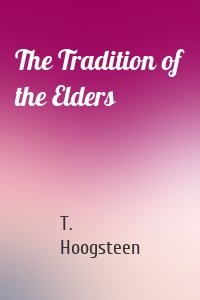T. Hoogsteen
4 кн.
Covenant Essays
Essays present a fascinating prose communication; well presented, each works out a consistent theme. The essays in this collection, created over a fifteen-year span, stand on their own, although several themes carry through–Jesus's lordship, the kingdom, the church, the faith; these constitute constants framed by the three Forms of Unity, that is, the original stuff of the Reformation.
| Автор | T. Hoogsteen |
The Tradition of the Elders
The Tradition of the Elders, based on Matt 15:1-20 and Mark 7:1-23, explores how the oral law upheld and promoted the anti-Christian forces of Pharisaism and Sadduceism. As such, they appear repeatedly in the New Testament documents, often as «the law» and «the works of the law.» For example, consider: – "When Gentiles who have not the law do by nature what the law requires, they are a law to themselves, even though they do not have the law" (Rom 2:14). – "We ourselves, who are Jews...
| Автор | T. Hoogsteen |
Covenant Works
In the development of Covenant Works I follow neither the way of the seventeenth-century Federal Theology, nor the way of nineteenth-century Critical Theology, nor the way of twentieth-century Federal Vision, nor the way of a compromise. Covenant Works lays open the Scriptures' biblical structure. The author integrates the covenant, Christology, the trinity, the kingdom, the church, and historical linearity into the Scriptures to reveal its architectonic unity.
| Автор | T. Hoogsteen |





